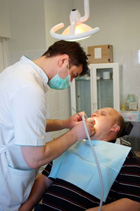 Every dentist surgery has a dental hygiene nurse; their job is to advise you on the best ways to prevent dental problems. Yet, not many patients actually ask their advice says a Leeds dentist. Oral Hygiene is the most important job we perform each day, if carried out properly then it will keep infections and bad breath away. It will also save us time in the dentist chair and money. There are 24 hours in a day and for the whole of that time out mouths are a hive of activity, most of it working against our teeth. At night our saliva gland sleeps when we sleep, saliva not only helps us swallow food, it also neutralises oral acid that is produced when bad bacteria feeds off fat and sugary debris that is trapped in between our teeth. Throughout the day that bacteria is feeding and producing acid that wears down the enamel on our teeth, so it is important we keep our mouths clean and watered all day and night. Tartar is a by-product of this process and is generally removed when we have our 6 monthly check ups, but in between visits it is eating away at our teeth. Before we brush we need to floss the teeth, this will loosen up the debris and any residue that is left from the night time. Then a vigorous brushing will loosen more, and finally a good rinse will remove the final bits. Throughout the day you can keep acid down by constantly swigging just plain water.
Every dentist surgery has a dental hygiene nurse; their job is to advise you on the best ways to prevent dental problems. Yet, not many patients actually ask their advice says a Leeds dentist. Oral Hygiene is the most important job we perform each day, if carried out properly then it will keep infections and bad breath away. It will also save us time in the dentist chair and money. There are 24 hours in a day and for the whole of that time out mouths are a hive of activity, most of it working against our teeth. At night our saliva gland sleeps when we sleep, saliva not only helps us swallow food, it also neutralises oral acid that is produced when bad bacteria feeds off fat and sugary debris that is trapped in between our teeth. Throughout the day that bacteria is feeding and producing acid that wears down the enamel on our teeth, so it is important we keep our mouths clean and watered all day and night. Tartar is a by-product of this process and is generally removed when we have our 6 monthly check ups, but in between visits it is eating away at our teeth. Before we brush we need to floss the teeth, this will loosen up the debris and any residue that is left from the night time. Then a vigorous brushing will loosen more, and finally a good rinse will remove the final bits. Throughout the day you can keep acid down by constantly swigging just plain water.





 The oral cavity is the gateway to the rest of the body. Air, water and food are all taken in through the mouth so it is fairly obvious that the mouth is going to have an affect on the rest of your body. In fact, the mouth can act as an indicator for overall bodily health as many medical conditions manifest symptoms in the mouth. In a similar way, oral conditions can have an affect on the rest of the body.
The oral cavity is the gateway to the rest of the body. Air, water and food are all taken in through the mouth so it is fairly obvious that the mouth is going to have an affect on the rest of your body. In fact, the mouth can act as an indicator for overall bodily health as many medical conditions manifest symptoms in the mouth. In a similar way, oral conditions can have an affect on the rest of the body.

